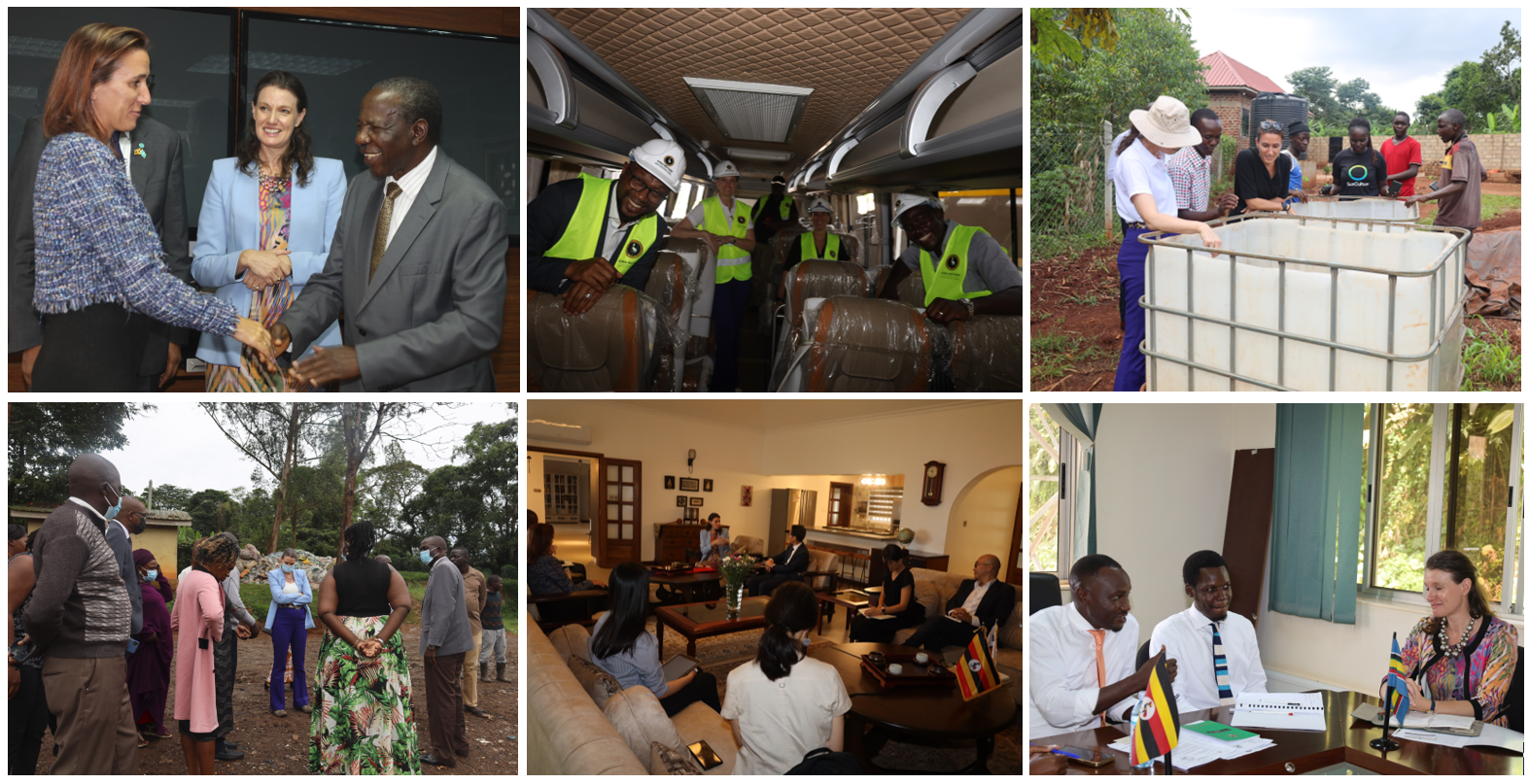written by Helena McLeod, Deputy Director-General and Head of the Green Growth Planning & Implementation (GGP&I) Division at the Global Green Growth Institute
–
As I leave Uganda after a week’s mission with Africa Director Dr. Malle Fofana, strategizing how to accelerate the green growth transition, I reflect on my key takeaways.
To help meet the global goals as well as Uganda’s green aspirations further funding is needed. The Minister of Finance Hon. Kasaija and I spoke about the just starting SPEAR program that included helping to implement Article 6 based international carbon trading in Uganda. Economic efficiencies can be gained through carbon trading for ambitious mitigation activities in Uganda that are currently unbankable. Carbon trading brings a further income flow for these activities, bringing them to bankability, and thereby helping the Government reach their economic and climate goals.
Despite Uganda’s financial and capacity challenges our work is contributing to green growth. We have developed industrial and urban masterplans, and waste policies and bylaws. I was moved to meet the mayor and Mukono municipality team who are passionate about improving the wellbeing of their municipality. Here we were taken to visit the Mukono waste dump Katikolo, where human-sized storks strut on top of the mountains of refuse. Yes, it smelt pungent as there is currently no adequate refuse processing, separation, or treatment of waste, and where we have designed a strong value chain solution that would maximize extracting recycling value from waste, bio-gas, organic fertilizer, and green jobs.
We have also focused on developing bankable projects including crowding in USD 5.5 – 6million of private sector finance into rooftop solar PV solutions, working with the innovative state-owned enterprise Kiira Motors Corporation (KMC), and crowding in USD10million into Solar Powered Irrigation Systems (SPIS), the latter replacing highly costly diesel, or where pumps are absent increasing yields.
I’d love for us to facilitate charging infrastructure to enable further scale-up in the e-mobility sector of Greater Kampala and beyond, for both e-motorbikes and e-buses. We visited the Kiira Motors Corporation factory which will be fully ready for operation later this year. We sat inside one of Uganda’s new electric buses and saw the factory floor which will employ about 600 employees under the dedicated leadership of Paul Musazizi, Kiira’s CEO.
Uganda has committed and ambitious development partners and it was a pleasure to meet with our funding partners’ representatives, including the Korean Ambassador H.E. Park Sung-soo, the EU Ambassador H.E. Jan Sadek, the Development Director Philip Smith of the British High Commission and their teams and equally great to meet knowledge partners such as the African Development Bank Principal Country Economist for Uganda Peter Rasmussen.
So where do I see the greatest opportunities for our work going forward? Our GGGI team is replicating GGGI’s successful pioneering work elsewhere in the world. GGGI supported the set-up of a Climate Finance Unit within the Ministry of Finance with funding from the UK and the EU where our embedded staff work side by side with government staff. I was inspired by the vision Dennis Mugagga, head of the Climate Finance Unit, presented to me and inspired by our dedicated staff Arthur Ssebbugga-Kimeze and Jenny Barnard, who are working tirelessly to attract additional climate funding to Uganda as part of this unit. This development is part of the “The Taskforce on Access to Climate Finance” initiative launched by various GGGI partners including the UK at the COP26.
The unit is giving Uganda much needed capacity to accelerate accessing climate finance. To meet their global climate commitment (within its NDC – Nationally Determined Contribution) Uganda requires
USD28billion by 2030. The Climate Finance Unit aims to mobilize USD1billion through various instruments such as carbon trading, grants from climate funds and potentially sustainability bonds – with GGGI’s support.
One of my priorities in 2024 is to support the realization of commitments linked to the Africa Middle East SAFE Initiative, a groundbreaking USD 10billion public private partnership between countries and institutions from Africa and the Middle East that GGGI is facilitating. The goals are;
a. Irrigate 2 million hectares of African farmland.
b. Enhance climate resilience for 10 million smallholder farmers, with a specific focus on women and young people.
c. Effectively address food security challenges.
Average agriculture yields in Africa are very low compared with best practice. For instance, for maize the average is 2 tonnes in Africa compared with the best practice of 19.2 tonnes per hectare. One of GGGI’s focus areas in Uganda and elsewhere is mobilizing finance for solar irrigation and during the mission I met with Emanuelle, a farm manager, who has invested in such a system. This allows him to have two harvests instead of one per year, cut out the back breaking work of manual extraction of water and increase annual yields. My preoccupation is to go beyond the thousands of farmers we are currently helping to how we can scale it to reach millions of farmers across Uganda and Africa. So, we met with other players that could play a role, like the public-private sector player, Agriculture Business Initiative (aBi), that facilitates affordable finance for farmers through banks.
Within GGGI I say our staff are our gold. No organization can be anything without its people. Of course, robust systems and technology exponentially increase productivity but without our people we are nothing. Our Country Representatives form a critical part of our delivery and in Uganda our Country Representative Dagmar Zwebe is a wonderful example of a green growth champion, leading disciplined delivery and empowering her team to deliver outstanding results. As one of our partners said, “We love Dagmar and we love the GGGI Team.” Overall, it was an excellent trip, I feel blessed to have returned to a country I care deeply about.
